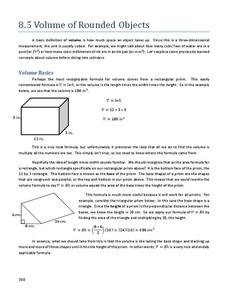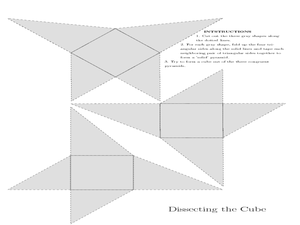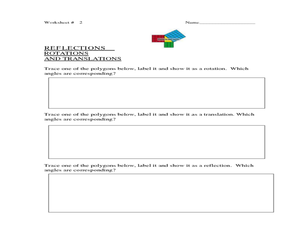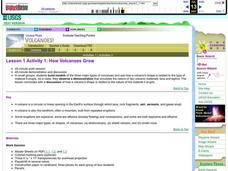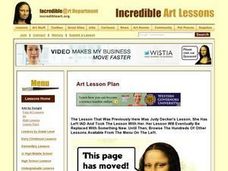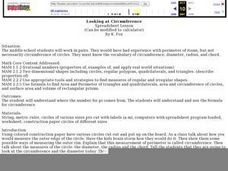Mathematics Vision Project
Module 5: Modeling with Geometry
Solids come in many shapes and sizes. Using geometry, scholars create two-dimensional cross-sections of various three-dimensional objects. They develop the lesson further by finding the volume of solids. The module then shifts...
Curated OER
Flexible "Glass" Sculpture
Older artists create 2-dimensional surfaces with paint, then use these paintings as the components of a 3-dimensional sculpture. They assemble a free-standing sculpture that may be viewed from any angle by using wire to create the shape....
Virginia Department of Education
Surface Area and Volume
Partners use materials to wrap three-dimensional objects to determine the formula for surface area. The groups use an orange to calculate the amount of peel it takes to completely cover the fruit. Using manipulatives, individuals then...
Statistics Education Web
It Creeps. It Crawls. Watch Out For The Blob!
How do you find the area of an irregular shape? Class members calculate the area of an irregular shape by finding the area of a random sampling of the shape. Individuals then utilize a confidence interval to improve accuracy and use a...
Mathed Up!
Nets, Plans, and Elevations
A dimensional resource teaches viewers to recognize 2-D views of 3-D objects and how to match nets with their 3-D figures. Individuals draw different views of three-dimensional objects including views from the front, side...
Curated OER
Orbital path of Landsat
Students comprehend how Landsat satellites orbit teh Earth to produce images. They comprehend the elliptical path of satellites. Students recognize that a different orbital path is needed for different satellites to perform their tasks....
Charleston School District
Volume of Rounded Objects
How much can different shapes hold? The answer varies depending on the shape and dimensions. Individuals learn the formulas for the volume of a sphere, cone, and cylinder. They apply the formulas to find the volume of these...
Curated OER
Shaded Bottles
Learners draw, and then paint three-dimensional bottles to practice shading which shows shape and perspective. The step-by-step process for creating dimensional still life art is outlined, which makes teaching art an attainable task. Oil...
Curated OER
Dissecting the Cube
Students investigate the volume of cones. In this geometry lesson, students define the formula to find the volume of cones. They define the concept of having to dissect a three dimensional figure and find the volume.
Curated OER
Point Comparisons
Young geometers investigate two-dimensional figures using coordinate grids. They identify polygons and draw examples of their reflection, rotation, and translation on a coordinate grid. And they complete a worksheet practicing examples...
Curated OER
Volume of Solids: Algebra/Geometry Institute
Use this volume of solids lesson to have learners find the surface area and volume of cylinders, pyramids, and prisms. They place cubes inside three-dimensional figures to determine the volume. Worksheets and answers are provided.
Curated OER
Chopping Cubes
Middle schoolers work in small groups to make various geometric solids with Play-Doh. They use fishing line to make cuts and observe the shapes of the cross-sections. Pupils complete an assessment in which they answer questions such as:...
American Institute of Physics
African American Inventors in History
A two-part lesson plan introduces young historians to the work of famous African American inventors. Groups first research and develop a presentation of an inventor that includes biographical information and information about one of...
Curated OER
Figurative Slot Sculptures
Middle schoolers create 3-dimensional works of art in the form of slot sculptures. I love this lesson, because it exposes students to a completely different form of art. Everything you need to do to successfully-implement this lesson is...
Dick Blick Art Materials
“Rhythm in Layers”
Young artists learn to build rhythm into a design by repeating colors, shapes, and patterns in a 3-D sculpture activity.
Curated OER
Quilting
Learners use a monochromatic palate, select shades and tints for a selected hue, or select complimentary or analogous colors for a quilt design. They design quilt squares using basic geometric shapes, repetition, balance, and proportion.
Curated OER
How Volcanoes Grow
Students build models of the three major types of volcanoes and see how a volcano's shape is related to the type of material it erupts. As a class, they observe a demonstration that simulates the nature of two volcanic materials: lava...
Grand Erie District School Board
Model Cell Project
If you're finishing up a unit on cells, here's a great project to get kids collaborating and recalling what they've learned in a fun and tangible way. Small groups create plant or animal cells out of materials they have at home. They use...
Curated OER
Halves and Fourths
Young mathematicians may not love fractions, but do they love sandwiches? How about cake? Use this visual fractions activity to represent fractions in a relatable way. Scholars start by coloring segmented shapes to indicate halves and...
Curated OER
Paper Maché Mancala Game Boards
Seventh graders create three dimensional works of art from two dimensional plans, develop skills in papier-mach?? technique, utilize elements and principles of design to create 3-D form, and develop math/strategy skills in playing the...
Curated OER
Gumdrop Crystal Models
A great way to learn about molecular structures is to make a model. Gumdrops and toothpicks are used to construct crystal models. The models are based on theories of crystal shapes that occur because of positive and or negatively charged...
Curated OER
Looking at Circumference
Young scholars understand where the number for pi comes from. They understand and use the formula for circumference. Students measure the circles given out and the diameters of those circles and record the results on their worksheet.
Teach Engineering
Circuits and Magnetic Fields
Have your class use compasses to try to find the magnetic field around an electric current. Groups use the same technique to visualize magnetic fields as they did in the second activity in the series, but this time, the field is...
Concord Consortium
The Six Faces of Amzora
Here's a task that is out of this world! Given a description of a fictional cube-shaped planet, scholars answer a set of questions about the planet. They create a two-dimensional map and consider the distances between locations on the map.
Other popular searches
- Three Dimensional Shapes
- 3 Dimensional Shapes
- 3 Dimensional Shapes
- 2 Dimensional Shapes
- Two Dimensional Shapes
- 2 or 3 Dimensional Shapes
- Math 3 Dimensional Shapes
- 3 Dimensional Shapes Art
- Create 3 Dimensional Shapes
- 2 Dimensional Shapes
- Free 3 Dimensional Shapes
- Three Dimensional Shapes






